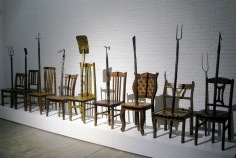BAI YILUO
白宜洛 |

source: saatchigallery
1968
Born in Luoyang, Henan Province, China
Lives and works in Beijing
Bai Yiluo works often incorporate photography and traditional sculptural techniques, media disparate in their ancient and contemporary connotations. Bai draws upon these to develop installations which reflect the human condition as a cyclical struggle, torturously beautiful and poetically triumphant. Bai’s Civilization is a haunting monument enshrining imperious power as a corrupted vision built on labourers’ toil. Made from terracotta, classical busts pose as emperors and slaves, pierced through and defined by agricultural tools, a life force and bane. Set upon twelve individual plinths, Civilization bridges reference to both Eastern and Western spiritualism, while its violent form suggests revolution, conflict, and rebirth as the isochronal quality of nature.
.
.
.
.
.
.
.
source: whiterabbitcollectionorg
“It does not matter what you do, you will never be able to escape from the experiences you’ve passed through.”
Born Luoyang, Henan, 1968. Lives and works in Beijing
A self-taught photographer, Bai Yiluo shifted into contemporary art while working as an assistant to Ai Weiwei. In Recycling (2008), he roped a giant anatomical model of a heart to a garbage-man’s tricycle cart in a literal interpretation of the saying “I threw my heart away.” What if someone really did decide to give his heart, Bai Yiluo says, “to the first guy who came around collecting rubbish”? If love is often tossed away recklessly or if people trash the love they are given, he adds, does that make love itself worthless? Utopia 1 (2011) is a mandala two metres in diameter and covered in intricate concentric patterns that evoke African textiles. To create it, the artist devised a flexible stencil-ruler that allowed him to hand-paint tiny circles, diamonds and Vs with the precise uniformity of a machine. The mandala and its flanking coat stands represent the entry of Chinese traders and manufactured goods into the alien culture of Africa. For Illumination (2012), Bai Yiluo spent four years collecting old oil lamps from all over China. The lamps—made obsolete by electricity—are chipped, rusting, and empty. The title is a suggestive paradox: there is no light here, and even if each lamp was lit, they would produce less total illumination than a few electric lights on the gallery ceiling. Those modern lights, indeed, are the reason these older ones are now valueless. Yet what spiritual illumination might China have discarded along with them and other “old rubbish”?
.
.
.
.
.
.
.
source: artlinkart
白宜洛生于河南,自幼喜爱绘画,在洛阳读小学。上高中被开除后,在洛阳拖拉机厂工作了5年,其间自学摄影。1994年来北京,在影楼工作。1998年值白宜洛30岁时,决定按照个人意愿生活——做艺术。白宜洛自认受好友艺术家庄辉很大的影响。白宜洛的摄影作品都来源于自己的周遭生活,所使用的创作辅助材料包括苍蝇、阴毛、标准照、针线、家具,显示了极为独特的艺术创作思维方式。白宜洛的作品及其经历,使我们看到一个个体在成长的挫折与人生抉择时所显示的顽强与才华。
.
.
.
.
.
.
.
source: baike
1968生于河南洛阳,现居北京。展览2001“发光体”艺术文件仓库北京中国“柏林艺术博览会”柏林德国TakePartUrsMeile画廊瑞士。2002“跑跳爬走” 远洋艺术中心北京中国“中国的当代性”圣保罗巴西“平遥国际摄影节”山西平遥中国。“中国艺术”柏林德国“自言自语”艺术文件仓库北京中国。2003“惦记”北京东京艺术工程北京中国。1968生于河南洛阳,现居北京。展览2001“发光体”艺术文件仓库北京中国“柏林艺术博览会”柏林德国 TakePartUrsMeile画廊瑞士。2002“跑跳爬走”远洋艺术中心北京中国“中国的当代性”圣保罗巴西“平遥国际摄影节”山西平遥中国。“中国艺术”柏林德国“自言自语”艺术文件仓库北京中国。2003“惦记”北京东京艺术工程北京中国。
1968生于河南洛阳,现居北京。展览2001“发光体”艺术文件仓库北京中国“柏林艺术博览会”柏林德国TakePartUrsMeile画廊瑞士。2002“跑跳爬走”远洋艺术中心北京中国“中国的当代性”圣保罗巴西“平遥国际摄影节”山西平遥中国。“中国艺术”柏林德国“自言自语”艺术文件仓库北京中国。2003“惦记” 北京东京艺术工程北京中国。1968生于河南洛阳,现居北京。展览2001“发光体”艺术文件仓库北京中国“柏林艺术博览会”柏林德国 TakePartUrsMeile画廊瑞士。2002“跑跳爬走”远洋艺术中心北京中国“中国的当代性”圣保罗巴西“平遥国际摄影节”山西平遥中国。“中国艺术”柏林德国“自言自语”艺术文件仓库北京中国。2003“惦记”北京东京艺术工程北京中国。

